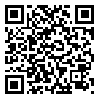Volume 17, Issue 1 (Occupational Medicine Quarterly Journal 2025)
tkj 2025, 17(1): 62-72 |
Back to browse issues page
Ethics code: 941124165
Download citation:
BibTeX | RIS | EndNote | Medlars | ProCite | Reference Manager | RefWorks
Send citation to:



BibTeX | RIS | EndNote | Medlars | ProCite | Reference Manager | RefWorks
Send citation to:
Sadra Abarghoei N, Akhavan A, Nazri M. Relationship between job stress and sleep deprivation with
burnout in train hoteliers. tkj 2025; 17 (1) :62-72
URL: http://tkj.ssu.ac.ir/article-1-1317-en.html
URL: http://tkj.ssu.ac.ir/article-1-1317-en.html
Member of Faculty of Industrial Engineering, University of Science and Art, Yazd, Iran , Nasersadra@yahoo.com
Abstract: (911 Views)
Introduction: Burnout refers to a decrease in an individual's ability to adapt to stressors and includes a syndrome consisting of emotional exhaustion and decreased personal success. A primary factor contributing to burnout is job stress. The job of train stewardess is one of the most stressful jobs due to the need to work in different work shifts, especially night shifts. Consequently, this study aimed to investigate the relationship between job-related stress, insufficient sleep, and burnout among Yazd-Tehran train attendants.
Materials and Methods: This study was a cross-sectional study. The research data were collected using the standard questionnaires for OSIPO job stress, burnout, and Petersburg sleep deprivation (PSQI). The Pearson and Spearman correlation method was applied using SPSS version 20 software to analyze the statistical data. The statistical population for this study comprised all the train crews of the Yazd-Tehran train. Based on the data supplied by the company’s hiring department, there were 123 individuals working on this line. Due to the small population, the sampling of this study was judgment, utilizing the Cochran formula, resulting in the selection of 90 individuals. The Cronbach's alpha method was utilized to determine both the validity and reliability of the test. Smart Pls software was used to examine the research hypotheses, and a significance level of less than 0.05 was considered.
Results: Male participants made up the majority of the sample at 68.9%. A considerable portion of the participants possessed a master's degree, making up 53.3%, whereas individuals holding a bachelor’s degree accounted for 34.5%. According to the model drawn, all paths had factor loadings greater than 0.4. The t-statistic value in this analysis was calculated for all confirmatory factor analysis relationships and greater than 1.96 for the structural model. The alpha value, Rho_A coefficient, and CR for every variables were all determined to be above 0.7, with the AVE value also evaluated to be greater than 0.5. To ensure the results, the bootstrapping test was also simulated in two cases of 500 and 800 samples, which did not change the results obtained and these paths were significant. First, descriptive results of the research variables were presented, and then the validity and reliability of the measurement tool were examined using convergent and divergent validity and structural equation modeling.
Conclusion: The results indicated that job stress positively and significantly impacts job burnout and sleep deprivation. The effect of this independent variable on the dependent variable of sleep deprivation is relatively high. Sleep deprivation also has a positive and significant effect on job burnout.
Materials and Methods: This study was a cross-sectional study. The research data were collected using the standard questionnaires for OSIPO job stress, burnout, and Petersburg sleep deprivation (PSQI). The Pearson and Spearman correlation method was applied using SPSS version 20 software to analyze the statistical data. The statistical population for this study comprised all the train crews of the Yazd-Tehran train. Based on the data supplied by the company’s hiring department, there were 123 individuals working on this line. Due to the small population, the sampling of this study was judgment, utilizing the Cochran formula, resulting in the selection of 90 individuals. The Cronbach's alpha method was utilized to determine both the validity and reliability of the test. Smart Pls software was used to examine the research hypotheses, and a significance level of less than 0.05 was considered.
Results: Male participants made up the majority of the sample at 68.9%. A considerable portion of the participants possessed a master's degree, making up 53.3%, whereas individuals holding a bachelor’s degree accounted for 34.5%. According to the model drawn, all paths had factor loadings greater than 0.4. The t-statistic value in this analysis was calculated for all confirmatory factor analysis relationships and greater than 1.96 for the structural model. The alpha value, Rho_A coefficient, and CR for every variables were all determined to be above 0.7, with the AVE value also evaluated to be greater than 0.5. To ensure the results, the bootstrapping test was also simulated in two cases of 500 and 800 samples, which did not change the results obtained and these paths were significant. First, descriptive results of the research variables were presented, and then the validity and reliability of the measurement tool were examined using convergent and divergent validity and structural equation modeling.
Conclusion: The results indicated that job stress positively and significantly impacts job burnout and sleep deprivation. The effect of this independent variable on the dependent variable of sleep deprivation is relatively high. Sleep deprivation also has a positive and significant effect on job burnout.
Type of Study: Research |
Subject:
Ergonomics
Received: 2024/07/9 | Accepted: 2025/03/30 | Published: 2025/03/30
Received: 2024/07/9 | Accepted: 2025/03/30 | Published: 2025/03/30
Send email to the article author
| Rights and permissions | |
 |
This work is licensed under a Creative Commons Attribution-NonCommercial 4.0 International License. |







